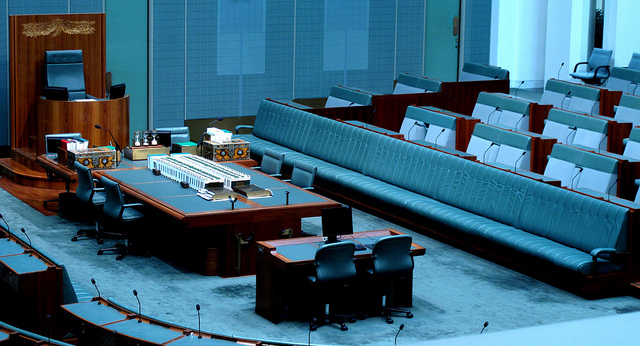
Heath Pickering
argues that ‘in the interests of democratic scrutiny and ensuring that any intervention occurs with broad political support, RAAF air strikes in Iraq (and potentially Syria) must be supported by a parliamentary vote in both houses’.
He cites the precedent of the UK where David Cameron lost a non-binding parliamentary vote last year (285–272) to support a British intervention in Syria. Prime Minister Cameron wasn't legally required to hold the vote, but chose to do so (to avoid a repeat of the country's swift backing for the invasion of Iraq).
No British government has previously lost a vote over matters of military involvement since at least the mid-19th century.
I’d support Heath’s call for greater information to be provided to parliament on decisions about defence deployments. That might include governments providing a statement to parliament outlining the basis of the decision and reporting on the progress of military operations.
But I’d reject the idea of parliament voting on decisions to go to war. Governments need the capacity to react quickly to events. Sometimes they won’t be able to disclose all secret intelligence that supports a decision. Most critically, where the government of the day doesn’t have control of the Senate—now the norm in Australian politics—the executive would be hamstrung in acting, regardless of the political, diplomatic and military circumstances of a crisis. The current
Ludlam bill would, if accepted, simply hamstring the government of the day to the whim of minor parties.
There’s also the practical issue of the time delay this will create in engaging personnel. That’s a big enough problem now for the ADF, without the added complication of having to get both houses involved, possibly out of session.
The bottom line is that in a two-chamber system any government that’s required to get the approval of both houses for overseas conflicts will simply be a hostage to fortune.
A one-chamber system might be workable if a vote on troop deployments was thought necessary. But we have that already in the House of Representatives, where members can change a government or the majority party can change a leader if they oppose a war strongly enough.
There’s also a fundamental question of ‘what’s a war?’ for the purposes of a vote. The US system is relevant here: the US Congress has 'war powers' but the president has authority to exercise right of self-defence which has seen
several wars/armed conflicts launched by the president without any reliance on Congress.
In any event, it’s not clear who in Australia would decide when parliament is to have a say on troop commitments, nor define the precise circumstances that would count as a ‘war’.
By the way, even if we introduced a vote to go to war I don’t think it would make any practical difference to the actual outcome. I can’t think of a single example where it would have changed a decision on Australia’s commitment to send our troops to war.
Anthony Bergin is deputy director of ASPI. Image courtesy of Flickr user Alison Young.[3] No British government has previously lost a vote over matters of military involvement since at least the mid-19th century: https://theconversation.com/commons-rejects-cameron-plea-for-syria-strikes-rewrites-special-relationship-17674
 Print This Post
Print This Post Heath Pickering argues that ‘in the interests of democratic scrutiny and ensuring that any intervention occurs with broad political support, RAAF air strikes in Iraq (and potentially Syria) must be supported by a parliamentary vote in both houses’.
Heath Pickering argues that ‘in the interests of democratic scrutiny and ensuring that any intervention occurs with broad political support, RAAF air strikes in Iraq (and potentially Syria) must be supported by a parliamentary vote in both houses’.